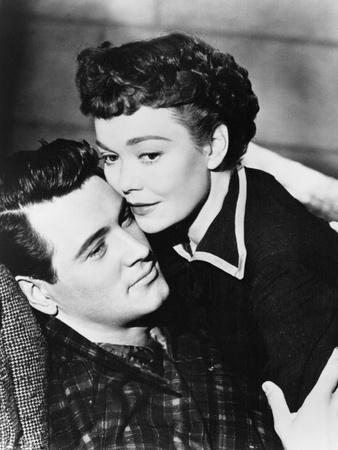

Knowing just how much work he put into honing his craft, you can’t help but admire what he was able to accomplish on the screen. Griffin allows us to see Hudson’s performances in a new light, whether in his melodramas or his comedies. Again and again and again, we see him throwing himself into the work of being an actor, whether taking direction from his directors (most notably Douglas Sirk, who seemed to simply get Hudson in a way that few other directors truly did) or researching a role with tremendous diligence. All That Heaven Allows, however, shows us just how devoted Hudson was to the craft of acting. Indeed, whereas some movie stars’ good looks seem very much a product of their era, even now Hudson blazes on the screen with the kind of male beauty that is rare in the real world. These days, it’s rather easy to dismiss Hudson as being a sub-par actor, someone who had the good fortune to be born with truly stunning good looks and a healthy dose of charisma.

However, whereas Grant could be quite curt and demanding, for the most part Hudson was generous, sometimes to a fault. In fact, as I was reading it I couldn’t help but think of another huge movie star of the era who was similarly conflicted in terms of his on-screen persona and his real life: Cary Grant. However, the Rock Hudson that emerges from the pages of this biography is a deeply human person, a genuinely warm and kind man who did everything in his power to help those around him. It would have been easy for Griffin to take a judgmental approach to Hudson and his life, painting his decision to remain in the closet as the act of a coward. Griffin’s book does a great deal to flesh out the contours of Rock’s life behind the screen, offering both insight into the star’s psychology as well as shedding new light on his screen performances. Of course, by this point in history it’s no secret that the cinematic straight guy Rock Hudson was in fact a closeted gay man and, thanks in part to Ryan Murphy’s historical fantasy series Hollywood, a whole new generation of now understands the tremendous pressure to conform that were an essential part of being in Hollywood in that era. Unfortunately, as Mark Griffin documents in his new book, All That Heaven Allows: A Biography of Rock Hudson, the flip side of this was that Hudson had to strenuously keep an essential part of himself secret from the world: his homosexuality. Starring in such successful melodramas as Magnificent Obsession, All That Heaven Allows, and Written on the Wind and in such romantic comedies as Pillow Talk and Lover Come Back, he seemed to have everything: box office success, male beauty, legions of adoring fans. In the 1950s and 1960s, no Hollywood star was so firmly associated with the all-American ideal of masculinity than Rock Hudson.


 0 kommentar(er)
0 kommentar(er)
